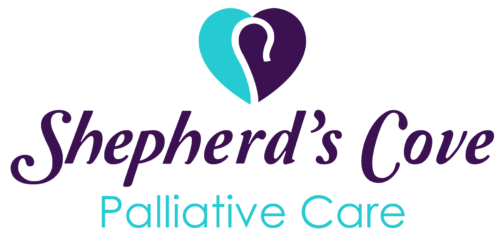What is Shepherd’s Cove Palliative Care?
A voluntary Board of Directors representing each partner governs SCPC. Through SCPC, an interdisciplinary palliative care team bridges the gap between hospital care and community care for those living with life threatening illnesses. The focus of the team is comfort, addressing not only physical symptoms, but emotional and spiritual suffering while assisting the patient and their family to gain access to care most aligned with their personal goals of care. It is the goal of the SCPC and the interdisciplinary team to improve the patient’s quality of life, as well as to avoid unnecessary hospital readmissions or unwanted treatments or procedures.
What is Palliative Care?
Palliative care
- allows patient to seek curative treatments while addressing comfort issues;
- provides relief from pain and other distressing symptoms;
- integrates psychological and spiritual aspects of care;
- offers support to help patients live as actively as possible;
- helps families cope with the patient’s illness; and
- advocates for patient and family to access community resources
Why should I consult SCPC?
SCPC consultation team has the ability to assist the attending physician by:
- Improving pain and symptom management.
- Helping patients and families clarify goals of care in order to:
- match the personal goals of care with physician’s orders;
- set realistic expectations;
- reduce ER visits; and
- identify hospice referrals earlier.
- Reducing ICU lengths of stay.
- Reducing 30-day readmission.
- Improving communication between physician and patient.
- Reducing hospital cost.
The difference between palliative and hospice care:
Palliative Care
- Care is provided in hospital and patient’s home.
- Patient can pursue curative treatments.
- Board certified palliative care physician consults and develops palliative treatment plan.
- CRNP trained in palliative care coordinates with physician to develop and implement the palliative treatment plan.
- Patient’s goals of care are clarified.
- RN follows up 1-2 times per month in patient’s home to assist with compliance to the palliative treatment plan.
- Social workers provide psychosocial support and assist in accessing community resources.
- Chaplains provide spiritual support.
- Consults are available Monday-Friday, 8:00 a.m. to 4:30 p.m.
- Medicare coverage is available for physican or nurse practitioner consultation only.
Hospice Care
- Care is provided anywhere a patient calls home including a contracted SNF, hospital, or hospice IPU.
- Hospice care is appropriate after completion of curative treatment.
- A team of healthcare professionals–including RNs, social workers, personal care aides and nurse practitioners–visit the patient weekly or more often.
- On-call RNs are available 24/7.
- Personal care aides and volunteers meet patient and family needs.
- Assistance with personal care and activities of daily living are provided.
- Social workers provide psychosocial support and assist in accessing community resources.
- Chaplains provide spiritual support.
- Volunteers provide companionship and support the family.
- Medications, equipment and/or supplies related to terminal illness are provded.
- Short term inpatient care is available.
- Short term respite care is available.
- Bereavement services are available to the grieving for one year.
- Services are covered by insurance.
- Indigent care is available.
How will palliative care help my patient?
Palliative care:
- provides symptomatic care, allowing the patient to be comfortable, enhancing their quality of life;
- bridges the gap of support with other healthcare providers;
- increases patient’s time in their home—not in hospital;
- implements earlier interventions and treatment compliance with the support of a RN following up in the home environment;
- provides ccess to community resources;
- provides the patient with a support team to help them navigate the physical, emotional and spiritual challenges of facing a life-threatening illness;
- empowers patients to control their care;
- provides them with a knowledgeable team to provide support and guidance, helping the patient to achieve their preferred goals of care; and
- supports families of patients, allowing them to better understand the patient’s needs and preferred goals of care.
What are the criteria for referral?
Diagnosis of a life threatening illness and any of the following:
- unacceptable level of pain or other symptom distress > 48-72 hours;
- uncontrolled psychosocial or spiritual issues;
- frequent visits to the emergency department for the same diagnosis;
- frequent hospital admissions for the same diagnosis in last 30 days;
- prolonged hospital length of stay (7-14 days) without evidence of improvement;
- prolonged stay in ICU setting without evidence of improvement;
- in an ICU setting with documented poor prognosis;
- dementia or Alzheimers FAST score of < 7 experiencing recurrent aspiration;
- cirrhosis experiencing encephalopathy;
- mechanical ventilation > 10 days;
- CHF—3rd admission in a year;
- COPD—3rd admission in a year; or
- Cancer—distressing symptoms.
How do I refer my patient to SCPC?
Call us Monday through Friday, 8:00 a.m. to 4:30 p.m. at 256-302-1663 for a consultation.
The SCPC office is located at 408 Martling Road, Suite A-105, Albertville, AL 35951.
